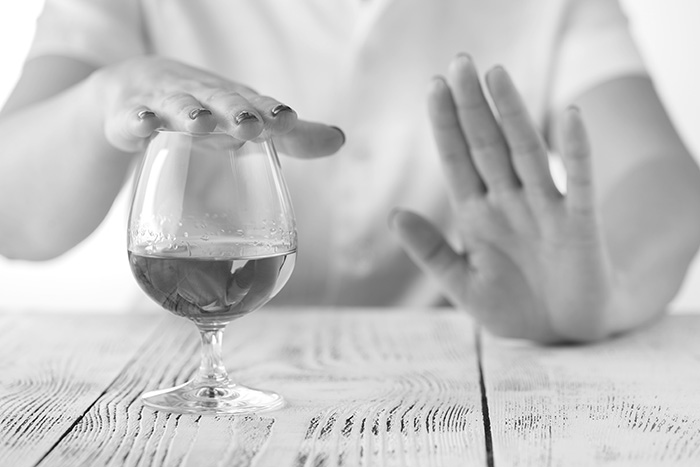By Heather Shoning with Haley Rae Shoning
THE WHYS AND HOW for getting sober or cutting back on your alcohol consumption

Photo by Shutterstock.com/ AndreyCherkasov
Editor/author’s note: This article includes the personal story of my daughter’s journey to being
sober. At age 24, she missed out on a potentially life-altering opportunity as it slipped through her fingers while she was busy clutching a cocktail.
Many people who drink alcohol have, at some point or another, questioned whether or not they are drinking too much. People consume alcohol for a number of reasons and in a variety of ways. Some people enjoy regular happy hours with coworkers or friends. Some enjoy a nice glass of wine while reading before bed. There’s always some activity or event happening that either focuses on drinking alcohol or at least has it available. After the holidays, many partake in dry January or make a New Year’s resolution to cut back or stop drinking altogether. If you are sober curious, many reasons might inspire you to ditch alcohol, and there are so many strategies to help make it easier than you think.
The Statistics
According to studies outlined by The National Center for Biotechnology Information, approximately 14 million Americans—7.4 percent of the population—meet the diagnostic criteria for alcohol abuse or alcoholism. Over the years, scientists have documented the effects of alcohol on many of the body’s organ systems and its role in the development of a variety of medical problems, including cardiovascular diseases, liver cirrhosis and fetal abnormalities. Dr. Omar Elhaj, chief medical officer at All Points North, a residential and outpatient care facility in Edwards.
First and foremost, we think of liver problems associated with alcohol consumption. The effects of alcohol on the liver include inflammation (alcoholic hepatitis) and cirrhosis (progressive liver scarring). The risk for liver disease is related to how much a person drinks: the more you drink, the greater your risk. Gender also may play a role in the development of alcohol-induced liver damage. Some evidence indicates that women are more susceptible than men to the cumulative effects of alcohol on the liver.
The liver is not the only cause for concern. In a meta-analysis, researchers compared the relationship between alcohol consumption and the risk of ischemic and hemorrhagic strokes. They found clear evidence that heavy drinking was associated with increased stroke risk, particularly in women. Similarly, long-term heavy alcohol consumption has been identified as an important risk factor for stroke in young people—in particular, drinking to intoxication is associated with a significant increase in the risk of ischemic stroke in both men and women ages 16 to 40 years old.
Additionally, alcohol consumption can be associated with high blood pressure and heart disease, as well as depression and anxiety, among a host of other ailments. It’s not just the major medical issues that are problematic. “Dehydration is an extremely concerning side effect of alcohol consumption, even at lower consumption levels, because it impacts our electrolytes, it impacts our ability to actually think and function,” Dr. Elhaj says. “One of the other things that alcohol impacts very significantly, even at lower levels, is our circadian rhythm, our sleep habits.”
Even lower levels of consumption affect the body in ways you might not realize are extremely damaging. The lymphatic system flushes toxins from our body, but as Dr. Elhaj explains, the brain has no lymphatic system. Its means for eliminating toxins is sleep. “You don’t have to have an alcohol use disorder to have a negative impact on your sleep from alcohol,” he says. Giving up or even cutting back on alcohol consumption can lead to less inflammation and better cognitive function. “It’s going to improve your brain function and your brain wellness,” Dr. Elhaj says.
Turning It Around
In addition to decreasing your risk of disease, cutting back or quitting drinking can improve mental well-being and help weight management by reducing overall caloric intake. Also, as Dr. Elhaj indicates, it can improve sleep quality and cognitive function, leading to better concentration and memory. It also reduces your risk of impaired coordination and judgment, which can lead to accidents or driving under the influence.
In some cases, people who drink experience strained relationships with family or friends—especially if drinking results in exaggerated behaviors such as arguing or other harmful actions. Reducing alcohol consumption can lead to more positive social interactions, potentially improving relationships with friends, family and colleagues.
If you’re curious about where you fall on the alcohol spectrum, CAPS Mental Health and DUI Services offers patients an evidence-based assessment. “One that we use is called the MAST—the Michigan Alcohol Screening Test,” says Lawrence Wall Jr., Chief Operations Officer & Clinical Director at CAPS – Mental Health & DUI Services. “When clients come in, we usually start there.” Based on the results, the CAPS team can make a recommendation for a level of treatment suitable to your situation, be it general outpatient treatment, which they offer in-house, or a more intense level of care for people with higher levels of alcohol dependency.
Wall, who first got certified as an addiction professional in Florida, then earned an MBA in healthcare, a Master of Science in mental health counseling and is currently working on his Ph.D. in clinical sexology, says one of the consequences of alcohol addiction is broken trust. “Clients come in and say, ‘Oh, I just went out with some friends for a couple of drinks and ended up staying all night at the bar. My wife or my husband was angry and wanted to know why I didn’t come home until two or three o’clock in the morning?’ This starts to break the trust in a relationship.” Trust is not always the only casualty of alcohol dependency.
In Her Words
I stopped drinking in February 2023, after a three-day bender—a bender which caused me to blow a job interview that effectively determined the direction of my life. I realized the next day, as I lay in my bed sweating and shaking from alcohol withdrawals, that if I couldn’t stop drinking long enough to prioritize something so important to me, I had a serious problem. I’ve tried and failed to get sober numerous times for many different reasons, but this was the realization that helped me to truly commit to my recovery.
The most challenging part of giving up drinking for me was navigating the difficulties of life without a crutch. When you become accustomed to numbing your feelings, experiencing a normal range of human emotions sober is a shock to your system. It’s hard, and it makes it even more difficult to stay sober.
I lost a lot of friendships. I think that’s almost a universal experience for people who are newly sober or in recovery, though—you realize how many of your relationships were built around drinking. Most of those friendships just fizzled out when I stopped going out drinking. However, my close friends have been incredibly supportive of my recovery and have cheered me on every step of the way. They celebrate every milestone and are very vocal about how proud they are of me. I also have a strong support system of friends I’ve made since getting sober, many of whom I met in Alcoholics Anonymous or other similar groups.
Getting sober and staying sober has not been easy. It’s something I wake up and recommit to every single day—sometimes multiple times throughout the day. Giving up drinking has positively impacted my life in almost every way. I got to know who I am at my core, and I love that person. The relationships I have with the people in my life now are deeper and more meaningful. I have had so many unbelievable experiences that I never would have had before I got sober.
How to Say No
“It’s becoming increasingly popular not to drink—whether it be long-term, for dry January or for health reasons,” Haley Rae says. “And it doesn’t mean you have to miss out! There are great mocktails on almost every bar menu, and more and more major alcohol companies are putting out NA options. When you first stop drinking, you might feel out of place or like you’re the only one, but you’re not. And no one is thinking about what’s in your cup.”
The first step in saying no is understanding why you’re doing it—reasons come in all sizes, big and small—and none should be discounted. Maybe it’s the health risks. Perhaps you’re just tired of feeling sluggish and hungover. Maybe drinking has taken a toll on your relationships. Maybe you missed out on an opportunity that could have changed your life. Whatever your why is, it’s valid, and it’s oftentimes what’s going to keep you committed to your goal of cutting back or quitting drinking.
“We have the illusion that alcohol enhances our joyous experience of life. Actually, it doesn’t,” Dr. Elhaj says. “We can do the same things and enjoy them the same amount without alcohol. It’s just an illusion. We can still have the same joy from conversations with close friends without alcohol, and we can have the same joy from wonderful meals without alcohol. We don’t really need it.”
One of the most effective motivators when trying to achieve any goal is making it public—or public-ish. Share your decision with friends, family or a support group. Having a support system can provide encouragement, understanding and accountability. Consider joining groups like Alcoholics Anonymous (AA) or talking to a counselor. There’s even a group for people just looking to commit to a limited amount of drinking, Moderation Management. If an in-person or even online group of strangers is not for you, Wall suggests enlisting a group to join you on your journey. “It’s very challenging to do some things on your own—without other people connecting with you,” he says. “To connect with others, suggest to a group of friends, family or coworkers to do it together: ‘Let’s go on a 30-day break from drinking together during the holidays.’ You can root each other on and support one another.”
You might need to reconsider who you spend time with—at least at the beginning of your sober journey. As Haley Rae mentioned, some relationships are based on drinking, and once you stop, those relationships might just naturally fizzle. And that’s OK—let them go. You’ll also need to learn to recognize situations, emotions or environments that trigger your desire to drink. Then, you can find healthier alternatives or coping mechanisms to address these triggers.
“Find activities that you truly enjoy doing that don’t involve drinking and make them a part of your everyday routine, Haley Rae says. “Seek out a support system—having people you can spend time with who don’t drink or are willing to spend time with you without drinking makes a huge difference.”
In addition to surrounding yourself with people who support your decision to quit, finding alternative ways to cope with stress and triggers can reduce the likelihood of turning to alcohol. Develop healthy stress management techniques like meditation, yoga or deep breathing exercises. Wall, who will celebrate 18 years of sobriety on January 23, also suggests journaling, using daily affirmations, writing down daily self-reflections and practicing gratitude.
If you find you’re struggling to maintain your commitment, consider professional help from a healthcare provider or addiction specialist. They can provide guidance and support tailored to your situation and potentially prescribe medications to help manage withdrawal symptoms if needed. All Points North offers a variety of levels of care, from outpatient counseling to detoxification and in-patient residential treatment. Also, understand that cravings may arise. Having a plan in place for dealing with these moments, whether it’s calling a friend, going for a walk or engaging in a favorite activity, can increase the odds that you’ll navigate the urge and stick to your intentions.
Last—but certainly not least—celebrate your wins! Whether it’s a week, a month or a year without alcohol, recognizing your progress can boost your motivation to continue. Also, don’t forget to celebrate the improvements in your health, relationships and overall well-being.
All Points North
2205 Cordillera Way
Edwards
apn.com
CAPS Mental Health and DUI Services
1100 W Littleton Blvd. Ste. 320
Littleton
303.495.2550
caps-mhds.com
Moderation Management
moderation.org


